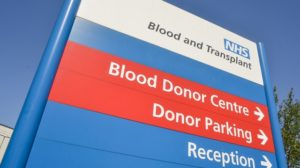670 new donors needed at Birmingham Donor Centre.
Black people in Birmingham are being urged to register to give blood after new figures revealed an urgent shortage of black donors in the city.
NHS Blood and Transplant needs 670* new black blood donors at Birmingham Donor Centre to help patients with sickle cell, a condition that mainly affects black people.
People from black African, black Caribbean and mixed heritage backgrounds are more likely to have the rare Ro blood subtype that is vital for sickle cell patients.

Sickle cell is the most common and fastest growing genetic disorder in the UK. Many of the 15,000 people living with the disease rely on frequent blood transfusions to lead normal lives.
Sickle cell can cause extreme pain, life-threatening infections and other complications such as organ failure, stroke or loss of vision. Regular blood transfusions help to prevent or relieve the painful symptoms and complications.
Carlene Scott, 32, from Solihull, was diagnosed with sickle cell as a baby. At the age of five she suffered a stroke caused by the childhood symptoms and has relied on donated blood ever since to help manage her condition.
Carlene used to receive regular blood transfusions but this led to a build-up of iron in her body, causing complications including an enlarged liver. She now has blood exchanges, where her blood is removed and replaced with donated blood. She has this treatment every four weeks, receiving between four and six units of blood each time.
“Sickle cell makes me so tired, it’s a rollercoaster every month as to how I feel. But after receiving blood I feel I can do more things – I feel I could be somewhat normal. It energises you and gives you a mental boost,” she said.
“I want to encourage more black people to give blood, to help people like me who depend on well matched blood. Giving blood is free and you can help someone else out. Just consider if it was one of your family members who needed blood.”
The rise in sickle cell patients combined with the increased use of blood transfusions to treat the disease has seen demand for Ro blood soar by 80 percent over the last three years.
NHS Blood and Transplant urgently needs 40,000 new black donors to meet this demand and help sickle cell patients across England. At Birmingham Donor Centre 670 donors are needed over the next year to help reach this target.
Around 12 percent of Birmingham’s population is black, but black people currently make up only 5.5 percent of the city’s blood donor base.
Suzy Morton, NHS Blood and Transplant consultant haematologist, who also works for University Hospitals Birmingham NHS Foundation Trust, said: “More and more black people in Birmingham are saving lives by donating blood but there is still a shortage of donors.
“People from similar ethnic backgrounds are more likely to have matching blood but the shortage of black donors means some black people with sickle cell disease in Birmingham don’t always get the best matched blood. Sometimes we can accept a less good match but other times we are forced to manage without blood when patients really need it.
“Black people are ten times more likely than white people to have the Ro blood subtype, which is key for providing effective treatment for people with sickle cell disease.
“Sickle cell is a serious genetic condition affecting the red blood cells that carry oxygen around the body. The blood cells form into a sickle or crescent shape and get stuck in blood vessels, causing acute episodes of extreme pain.
“In the long term sickle cell disease can cause stroke, organ failure and blindness, and the complications can be fatal. Blood donation is quick, easy and safe. You will save lives.”
You can register as a donor and book an appointment to give blood at www.blood.co.uk


